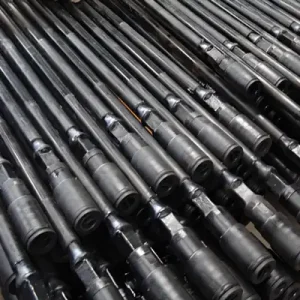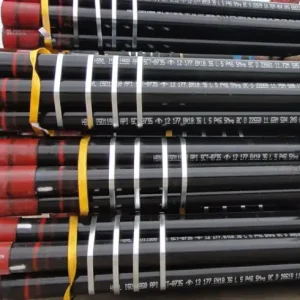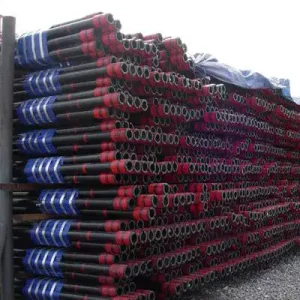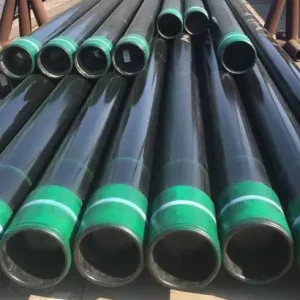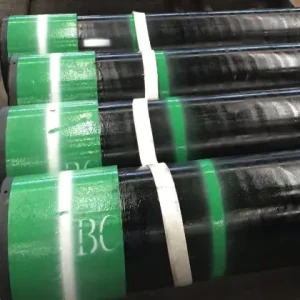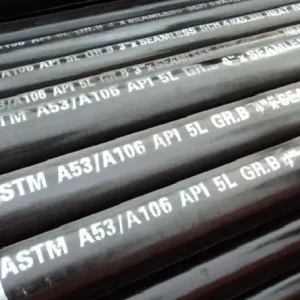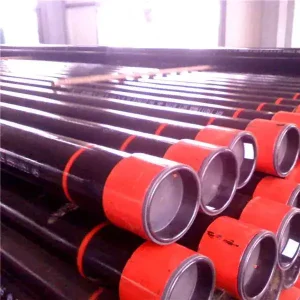Oil Country Tubular Goods
Products
Oil Country Tubular Goods (OCTG) are the steel tubular products that form the structural and pressure-bearing backbone of every oil and gas well; choosing the correct grade, connection, and supply route directly determines well safety, total life-cycle cost, and delivery risk. MWAlloys supplies the full OCTG family — casing, tubing, drill pipe and accessories — manufactured in China to international standards, offered at 100% factory pricing and with fast inventory dispatch for urgent projects.
What is OCTG?
Oil Country Tubular Goods (OCTG) refers to the group of steel tubular products used in drilling, completing and producing oil and gas wells — principally drill pipe, casing and tubing, plus couplings/connections and related accessories. These pipes must resist axial loads, internal and external pressure, collapse and corrosive downhole environments while maintaining connection integrity under cyclic loading. The standard framework for most OCTG production and inspection is API SPEC 5CT; manufacturers and buyers normally specify grades by API codes (J55, K55, N80, L80, P110, etc.) and by Product Specification Level (PSL-1, PSL-2, PSL-3).
Industry standards and API 5CT overview
API SPEC 5CT is the principal specification for casing and tubing used in petroleum and natural gas well applications. It defines grade classifications, manufacturing tolerances, marking, mechanical property minima, heat-treatment requirements and acceptance testing. Product Specification Levels (PSL) define escalating quality and documentation requirements: PSL-1 is baseline, PSL-2 adds chemical and mechanical verification, and PSL-3 (where applicable) covers enhanced property and testing controls. Thread types and couplings are covered separately by API 5B and industry connection standards (regular API threads, premium made-by-manufacturers). Typical OCTG manufacturing includes seamless and high-quality welded processes where permitted, with most critical customers preferring seamless tubing/casing for demanding wells.
Common OCTG grades — chemical composition
Below is a condensed reference table showing typical chemical composition ranges for widely used API 5CT grades. These ranges are representative of published manufacturer and industry tables; final composition always depends on the mill order, PSL and any proprietary modifications.
| Grade | C (%) | Si (%) | Mn (%) | P (max %) | S (max %) | Cr (%) | Mo (%) | Remarks |
|---|---|---|---|---|---|---|---|---|
| J55 | 0.34–0.39 | 0.20–0.35 | 1.25–1.50 | ≤0.020 | ≤0.015 | ≤0.15 | ≤0.20 | Economy casing grade; normal well conditions. |
| K55 | 0.34–0.39 | 0.20–0.35 | 1.25–1.50 | ≤0.020 | ≤0.015 | ≤0.15 | ≤0.20 | Similar to J55 but higher tensile minima. |
| N80-1 | 0.34–0.38 | 0.20–0.35 | 1.45–1.70 | ≤0.020 | ≤0.015 | ≤0.15 | 0.11–0.16 | Higher strength carbon steel, common in medium-depth wells. |
| L80 (13Cr) | 0.15–0.22 | ≤1.00 | 0.25–1.00 | ≤0.020 | ≤0.010 | 12.0–14.0 | ≤0.20 | Corrosion-resistant martensitic 13Cr variant for sour/CO₂ service. |
| P110 | 0.26–0.395 | 0.17–0.37 | 0.40–0.70 | ≤0.020 | ≤0.010 | 0.80–1.10 | 0.15–0.25 | High-strength grade for deep/high-pressure wells. |
Note: API permits many proprietary or specialty modifications (e.g., N80Q, L80-1, L80-9Cr). Always request the mill chemical certificate (MTC) for contract acceptance.
Mechanical properties by grade
Mechanical property minima vary by grade, heat treatment and PSL. The table below summarizes common targets used in procurement documents; actual mill certificates must be consulted for each delivery.
| Grade | Typical Yield (MPa) | Typical Tensile (MPa) | Elongation (%) | Typical use |
|---|---|---|---|---|
| J55 | ~379–552 | ≥517 | ≥19 | Surface casing and low-demand wells. |
| K55 | ~379–552 | ≥655 | ≥15 | Deeper than J55; often used where higher tensile needed. |
| N80-1 | 552–758 | ~689 | ≥12 | Intermediate strength for many production casing runs. |
| L80 | 552–758 (depends on subtype) | ≥655 | ≥12 | Corrosion-resistant option (13Cr) for CO₂/H₂S environments. |
| P110 | 758–965 | ≥862 | ≥10 | High-strength casing/tubing for deep/high-pressure wells. |
OCTG specifications & dimensional ranges
API 5CT sets dimensional tolerances and commonly used nominal sizes. Below is a compact summary.
| Product | Typical nominal OD range | Typical length | Thread type |
|---|---|---|---|
| Casing (surface, intermediate, production) | 4½" — 20" (common wells) | R1 (6.1–7.3m), R2 (8.5–9.7m), R3 (11.6–12.8m) | API regular (BTC/LTC/STC), premium connections |
| Tubing | 1.0" — 3 ½" (common sizes: 1.315", 1.9", 2 3/8") | R1–R3 | EUE, NUE, premium tubing threads |
| Drill pipe | 3 ½" — 6 5/8" | Typically single joints ~31 ft (9.45m) | API 5DP connections, compound threads |
| Couplings & Accessories | As required for OD & thread | n/a | Listed per API 5B / manufacturer specs |
Thread selection and premium connections significantly affect joint strength and torque capacity; premium threads are often selected for extended reach or highly deviated wells where connection fatigue controls design.
Product catalog
MWAlloys ships a complete OCTG portfolio from factory stock and made-to-order production:
-
Casing: conductor, surface, intermediate and production casing in J55, K55, N80, L80 (including 13Cr), P110 and proprietary grades. Lengths: R1/R2/R3; both seamless and high-quality welded where permitted.
-
Tubing: standard tubing sizes (1.000", 1.315", 1.900", 2.063", 2.375") in API grades and PSL levels, plain ends, plated/coated or with premium coupling options.
-
Drill pipe: standard and heavy-duty drill pipe, tool joints, and upset ends in common grades.
-
Connections & couplings: API couplings, premium connections (VAM®, Tenaris Hydril style equivalents), short thread (STC) and long thread (LTC) options.
-
Accessories: pup joints, crossover subs, float equipment, centralizers and threaded protectors.
-
Value services: custom heat treatment, thread facing, premium marking, MTC and full mill traceability.
MWAlloys emphasizes factory pricing (direct from our Chinese mill partners), inventory availability for fast dispatch, and tailored packaging for export logistics.
Material selection: environment and special grades
Selecting OCTG must match downhole environment and service life:
-
Normal service (low H₂S, low CO₂): J55/K55 and N80 are cost-effective.
-
Corrosive / sour service (H₂S present): low-alloy Cr-bearing grades or corrosion-resistant alloys (L80-13Cr, 13Cr martensitic, or higher Ni/Cr blends) improve resistance to sulfide stress cracking and pitting. L80 13Cr variants are widely used for wells with CO₂/H₂S exposure.
-
High pressure / deep wells: high-strength P110 and Q125 grades provide higher collapse, burst and tensile margins.
-
Fatigue / cyclic loading: premium connections and controlled heat treatment improve joint performance. Consider full fatigue testing requirements in tender docs.
Always request NACE/ISO sour-service endorsements, Charpy impact testing for low-temperature wells, and any specific material certifications required by operators.
Manufacturing, quality control and traceability
Key manufacturing and inspection items buyers must require:
-
Mill Test Certificate (MTC): full chemical and mechanical results traceable to heat number.
-
Non-Destructive Testing (NDT): ultrasonic or eddy current testing for seamless pipes; hydrostatic tests per API; additional NDT for PSL-2/3.
-
Heat treatment: normalized, quenched & tempered or martensitic processes depending on grade and application.
-
Microstructure and inclusion control: verifies grain structure and cleanliness for fatigue performance.
-
Marking & packaging: per API 5CT marking; export-grade packing and joint protectors for sea shipments.
-
Third-party inspection: optional inspection at mill (BV, SGS, Intertek) for high-value contracts.
MWAlloys coordinates mill QA/QC, third-party inspections and logistics to reduce buyer administrative load.
Market trends and 2025 outlook
The OCTG market has shown recovery and uneven regional demand through 2023–2025. Several drivers shape the landscape in 2025:
-
Upstream activity and oil price linkage: OCTG demand closely tracks drilling and completion activity; global OCTG market size is reported to grow from roughly $29–30 billion in 2024 toward higher values in 2025, with analyst forecasts projecting mid-single digit to high-single digit growth for 2025 depending on region.
-
Trade policy and tariffs: recent tariff actions and trade measures on steel have affected landed OCTG costs in some markets, adding import risk and potential price volatility for buyers outside major producing regions.
-
Material costs & raw inputs: iron ore and energy price swings influence mill operating cost; declining iron ore has partially pressured base steel costs in 2025.
-
Technological substitution: premium metallurgy, corrosion-resistant tubulars and higher-performance connections continue to gain share for complex wells.
-
Regional supply shifts: China remains a large global supplier for standard OCTG, while North America, the Middle East and Turkey supply higher-value or regional lots; supply chains remain sensitive to shipping and trade measures.
Published market reports and price indices show the OCTG sector in 2025 experiencing mixed price trends and tighter lead times for premium grades. Buyers should lock specifications early and consider strategic inventory purchasing for high-risk wells.
Global price comparison 2025
Price transparency in OCTG is limited; however market monitors and supplier listings provide indicative ranges. The table below gives representative 2025 ranges for commodity OCTG products; final quotes will vary by grade, PSL, OD, wall, thread and order volume.
| Region / Source | Typical 2025 range (USD/metric tonne) | Notes & context |
|---|---|---|
| China (seamless OCTG listings) | $500 — $1,700 / t | Wide spread due to grade (basic casing vs premium tubing). Manufacturer listings show low-end bulk casing and higher-end premium tubing at higher prices. |
| India (domestic & imports) | $900 — $1,600 / t | Domestic mills plus imports; premium grades and stainless variants cost more. |
| North America (FOB / market indices) | $1,500 — $2,400 / t | Regional FOB prices and index reports show higher landed costs and tariff impacts; premium sizes higher. |
| Europe / Turkey | $1,200 — $2,000 / t | Turkey acts as regional supplier for welded and seamless goods; market indices volatile. |
| Stainless / specialty OCTG | $3,000 — $8,500 / t (stainless) | Stainless alloy tubulars and high-Ni alloys command a much higher premium. IndexBox reported stainless export price surges. |
Interpretation and procurement tips: the ranges above are indicative. For bulk standard casing (low alloy, PSL-1), China offers competitive factory pricing near the low end of the scale; premium grades, small batch orders or PSL-2/3 documented material will push prices toward the mid/high end. Market indices such as Argus and specialized pricing services are recommended for contract benchmarking.
Procurement strategies, lead time and logistics
Good procurement practices reduce project risk and cost:
-
Specify PSL and acceptance tests up front. PSL-2/3 and sour-service requirements lengthen lead time.
-
Bundle larger volumes to secure factory pricing. MWAlloys can consolidate mill spots to hold price and reduce per-ton freight.
-
Approve mill samples, MTC and inspection plans early. This prevents late rejections and costly reorders.
-
Plan for thread protection and packaging for long sea voyages. Use coated threads plus internal/external protection for sea shipments.
-
Build contingency for tariffs and trade controls. Recent tariff changes in major consuming markets have affected landed costs in 2025.
MWAlloys advantages: We partner with qualified Chinese mills, maintain stock for high-demand standard sizes, and offer factory pricing (no trader margin). Our team can dispatch inventory quickly from mill or warehouse to major ports, and we handle inspection scheduling with third-party agencies on request.
Frequently asked questions
1) What is the difference between casing and tubing?
Casing is installed to stabilize the wellbore and isolate formations; tubing is run inside casing to produce fluids to surface. Casing sizes are larger and built for structural support; tubing OD is smaller and designed for flow and pressure containment.
2) How do I select the correct OCTG grade?
Match grade to downhole conditions: pressure, temperature, collapse/burst loads, and corrosivity (CO₂/H₂S). For sour environments, consider 13Cr or corrosion-resistant options and obtain NACE testing where required.
3) What documentation should accompany a shipment?
Minimum: Mill Test Certificate (MTC), inspection reports (ultrasonic/NDT), heat treatment records, thread gauge reports, and packing list. PSL-2/3 require more detailed traceability.
4) Seamless or welded — which is better?
Seamless is generally preferred for critical high-pressure wells because of uniform microstructure and fewer longitudinal defects. High-quality welded pipes are acceptable for some applications where permitted by standard and operator.
5) What are premium connections and do I need them?
Premium connections (manufactured proprietary threads) deliver greater torque, burst and fatigue resistance than basic API threads; they are often required for deviated or long-reach wells.
6) How long are typical lead times?
Factory lead time depends on grade and PSL; standard casing from stock can ship in weeks, while custom or PSL-2/3 orders and premium grades may take months. MWAlloys maintains inventory for common sizes and fast dispatch.
7) How is OCTG priced?
Pricing depends on grade, OD/wall, PSL, thread/coupling, heat treatment and volume. Raw steel cost and regional tariffs also influence landed price. Use indices (Argus, regional price reports) for benchmarking.
8) Can MWAlloys supply to global projects?
Yes — MWAlloys ships worldwide. We handle export documentation, packaging and port logistics; factory pricing means competitive landed cost for large orders.
9) How do I ensure sour-service compatibility?
Request NACE MR0175/ISO 15156 compliance where necessary, verify Charpy impact values, and obtain sulfide stress cracking test results for the grade used.
10) Are stainless or nickel alloys commonly used?
They are used for especially corrosive environments or very high temperatures. These alloys carry a large price premium and require separate procurement planning and extended lead times.
Closing summary and how to request a quote
OCTG purchasing balances technical fit, quality assurance and cost. For standard projects, properly specified API 5CT grades delivered from a Chinese mill provide attractive cost and lead-time benefits. For challenging wells (sour, deep, high-cycle) specify premium materials and connections up front.
About MWAlloys: we are an experienced metal materials supplier specializing in OCTG. We source full product lines directly from qualified Chinese mills, offer 100% factory pricing with minimal markup, maintain inventory for fast dispatch and support third-party inspection. To receive an immediate quotation, supply the following: grade (API code), OD × wall, thread type, PSL level, quantity, delivery port and required inspection. Our sales team will return a tailored quote and provisional lead time within one working day.

